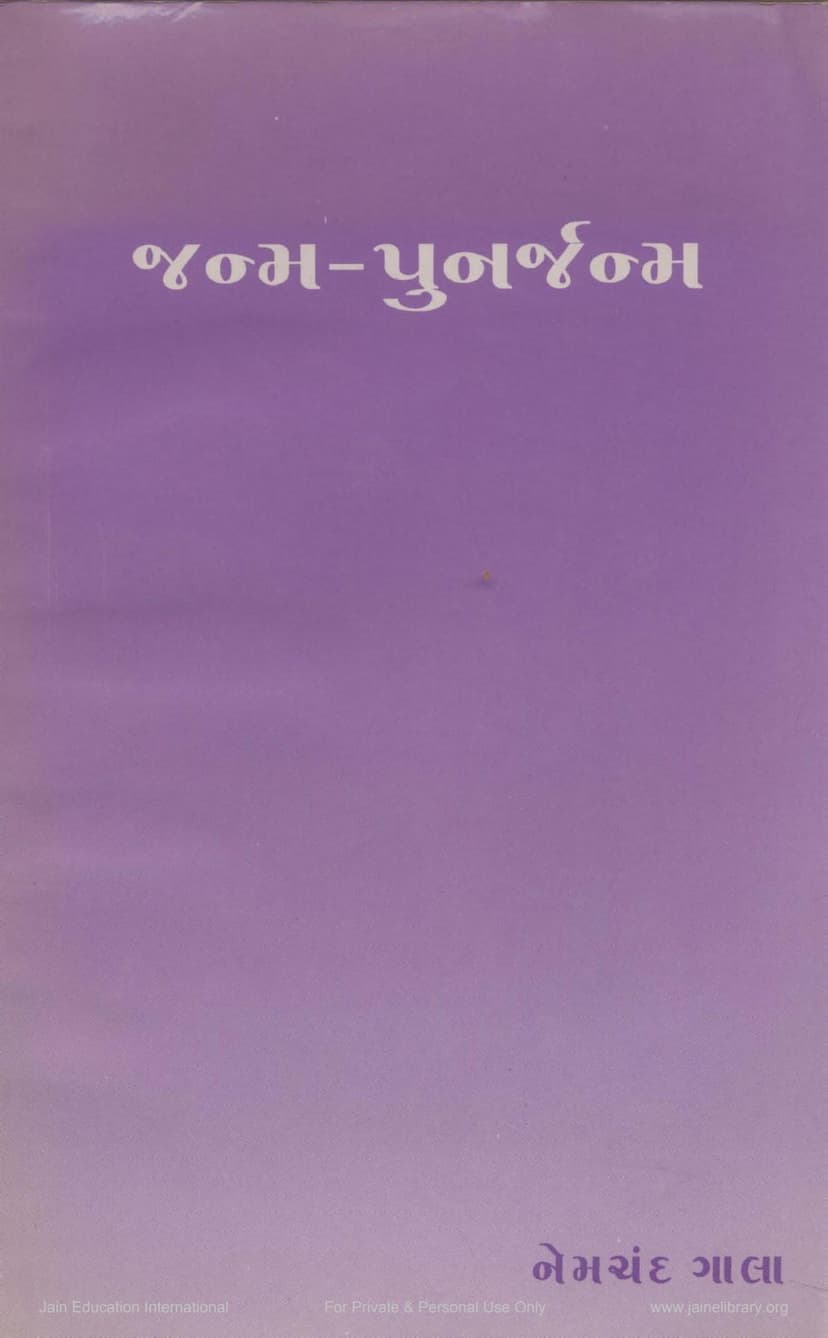Janma Punarjanma
Added to library: September 2, 2025

Summary
Here's a comprehensive summary of the Jain text "Janma Punarjanma" by Nemchand Gala, based on the provided pages:
Title: Janma Punarjanma (Birth and Rebirth) Author: Nemchand Gala Publisher: Shantaben Nemchand Gala Publication Year: 1992 Edition: First Print Run: 2,250 copies Price: Rs. 50
Core Theme: The book "Janma Punarjanma" by Nemchand Gala explores the Jain philosophical concept of birth and rebirth, delving into the intricate workings of karma, the soul's journey through various lifetimes, and the ultimate goal of liberation (moksha). It seeks to provide a comprehensive understanding of these concepts by drawing from Jain philosophy, ancient Indian thought, and even touching upon Western philosophical and scientific perspectives.
Key Concepts and Content:
- The Nature of the Soul and Rebirth: The book posits that the soul (Atman or Jiva) is an eternal, unchanging, and pure entity that, through its association with matter (pudgal) and the accumulation of karma, transmigrates through different life forms. This cycle of birth, death, and rebirth is driven by karma and continues until the soul achieves liberation.
- Karma and its Law: A central tenet discussed is the law of karma, where every action (karma) has a consequence. These consequences, both positive and negative, shape an individual's present and future lives. The book emphasizes that good deeds lead to favorable rebirths, while negative actions lead to suffering. The concept of "runanubandh" (debt or connection from past lives) is presented as the underlying principle that brings souls together in relationships and circumstances.
- The Goal of Liberation (Moksha): The ultimate aim of the soul's journey is moksha, a state of complete freedom from the cycle of birth and death and the eradication of all karma. This liberation is achieved through self-realization, detachment from worldly desires, and the practice of right faith, right knowledge, and right conduct as espoused in Jainism.
- Philosophical and Scientific Exploration: The author attempts to connect Jain principles with broader philosophical and scientific discussions. He references various Western philosophers like Plato, Aristotle, Socrates, and thinkers like Kant, Bergson, and Russell, examining their views on existence, the soul, and the afterlife. The book also touches upon parapsychology and scientific research into reincarnation, citing instances like "Jatismarana" (remembering past lives) and the work of researchers like Dr. Ian Stevenson and Dr. Alexander Cannon, which suggests that scientific inquiry is beginning to explore concepts previously confined to spiritual or religious domains.
- Cross-Cultural Perspectives: The book incorporates insights from other religious and philosophical traditions, including Sufism, Buddhism, Christianity, Islam, and Zoroastrianism, to provide a wider context for the concepts of rebirth and the soul's destiny.
- The Importance of the Human Birth: The author strongly emphasizes the rarity and preciousness of the human birth, considering it the most opportune moment for spiritual progress and the attainment of liberation. The book highlights that this birth is a consequence of accumulated merit from past lives and provides the potential for breaking free from the cycle.
- The Role of Knowledge and Conduct: The book stresses that true liberation comes not just from theoretical knowledge but from the practical application of spiritual principles through virtuous conduct, detachment, and self-discipline. The Jain path of right faith, right knowledge, and right conduct is presented as the means to achieve this.
- The Nature of "I": A significant portion of the text is dedicated to the philosophical inquiry of "Who am I?". It encourages introspection and self-discovery to understand the true nature of the soul, distinct from the physical body, mind, and ego. The author draws parallels with the Sufi concept of "Hu" and the Vedantic idea of the soul being a part of the supreme soul.
- The Significance of Thoughts and Actions: The book underscores that every thought, word, and deed creates a karmic imprint, influencing future experiences. The importance of pure thoughts, ethical conduct, and controlling desires and passions is repeatedly highlighted.
- The Role of Gratitude and Acceptance: The author touches upon the importance of gratitude for what one has and accepting one's circumstances, as well as cultivating compassion and understanding towards others.
- The Nature of Death and Transition: Death is presented not as an end but as a transition, a change of form or dwelling for the soul. The book uses metaphors like changing clothes or moving from one room to another to explain this continuous journey of the soul.
- Personal Reflections and Examples: The author shares personal reflections and anecdotes, including references to spiritual figures like Shrimad Rajchandra, Mahatma Gandhi, Swami Vivekananda, and Rabindranath Tagore, to illustrate the profoundness of these spiritual truths. The book also includes summaries of accounts of past-life recall and near-death experiences.
- Jain Specifics: While discussing broader themes, the book remains rooted in Jain philosophy, referencing concepts like "leshyas" (soul states), "dravyanuyoga," "charitranuyoga," and the importance of "samayika" (equanimity) and "tapa" (austerity) for karmic purification and liberation.
Overall Message: "Janma Punarjanma" aims to guide the reader towards a deeper understanding of the soul's eternal journey, the consequences of one's actions, and the path to spiritual freedom. It encourages introspection, ethical living, and the pursuit of self-realization as the ultimate means to transcend the cycle of birth and rebirth and achieve the eternal state of moksha. The book offers a comprehensive perspective, blending spiritual wisdom with intellectual curiosity, and encourages the reader to engage with these profound questions of existence.